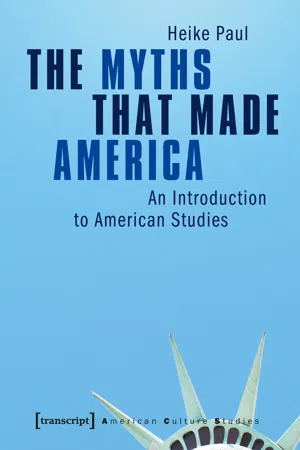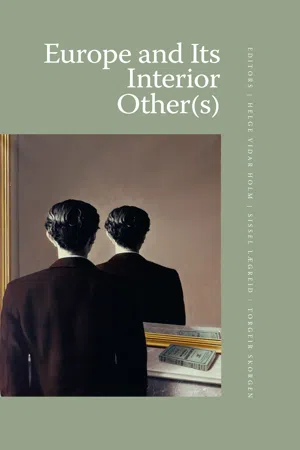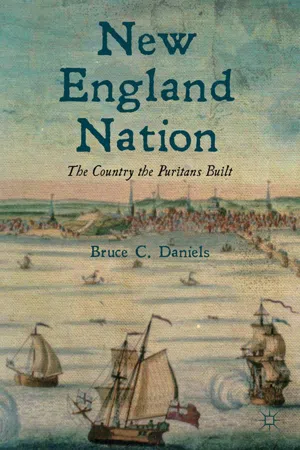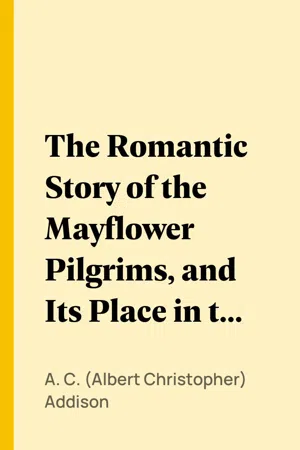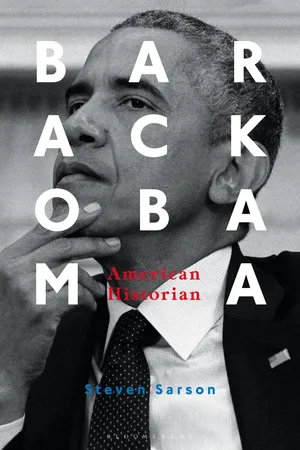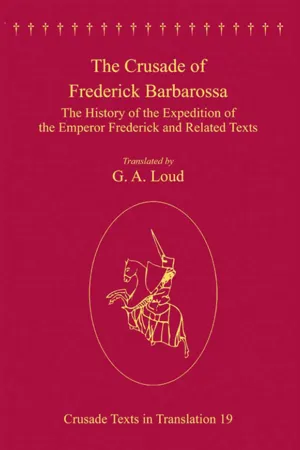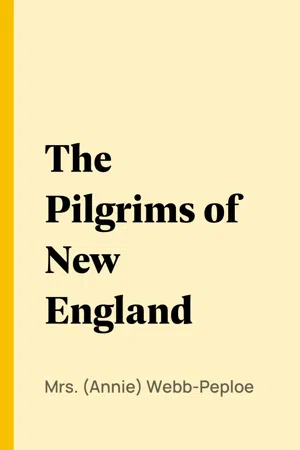History
The Pilgrims
The Pilgrims were a group of English Separatists who fled religious persecution in England and settled in the Plymouth Colony in 1620. They are known for their role in the first Thanksgiving celebration with the Wampanoag Native Americans. The Pilgrims' journey on the Mayflower and their establishment of a self-governing colony have become iconic symbols of early American history.
Written by Perlego with AI-assistance
Related key terms
1 of 5
8 Key excerpts on "The Pilgrims"
- eBook - PDF
The Myths That Made America
An Introduction to American Studies
- Heike Paul(Author)
- 2014(Publication Date)
- transcript Verlag(Publisher)
They considered America their Promised Land, thus taking biblical scripture as prophecy and anticipating its fulfillment in their own lived reality in North America. In history and scholarship, the terms ‘Pilgrims’ and ‘Puritans’ are sometimes used synonymously, and this conflation indicates that the two groups had many things in common. For reasons of his-torical accuracy, however, we should be precise about the terminology: The Pilgrims were religious separatists who reached America in 1620 on board of the Mayflower with William Bradford (1590-1657); when sailing for the ‘new world,’ they had been granted land and support by the Virginia Company, yet, landing further north on the coastline, they ‘missed’ Virginia – perhaps purpose-fully so – and founded Plymouth, as legend has it, at the site of a rock. Within a few years, the colony had 2.500 inhabitants and maintained quite a rigorous community life. The Puritans – originally having been a derogatory term, they did not refer to themselves as such – arrived in 1630 on board of the Arbella and several other ships under the guidance of John Winthrop (1588-1649) after they had been granted the right to settle a new colony by Charles I, and founded the city of Boston, which for a long time remained the center of the Massachusetts Bay Colony. The Pilgrims and the Puritans thus originally formed distinct communities, but interacted with each other (as well as with the Native popula-tion). The so-called Great Migration (1630-40) brought many newcomers from P ILGRIMS AND P URITANS AND THE M YTH OF THE P ROMISED L AND | 139 England to the Massachusetts Bay Colony, which soon outnumbered Bradford’s Plymouth Colony by far. By 1640, there were about 10.000 settlers. Three generations later, in 1691, English colonial politics eventually merged the two colonies into the so-called Province of Massachusetts Bay. - eBook - PDF
- Helge Vidar Holm, Sissel Lægreid, Torgeir Skorgen, Helge Holm, Sissel Laegreid, Torgeir Skorgen, Helge Vidar Holm, Sissel Lægreid, Helge Holm, Sissel Laegreid, Torgeir Skorgen(Authors)
- 2014(Publication Date)
- Aarhus University Press(Publisher)
As separatist dissenters, the Mayflower Pilgrims held the status of heretics, and religious intolerance was the primary reason why they left for the New World in 1620, seeking a place where they could practice their religion without persecution while remaining English subjects. Early seventeenth-century Europe was also impacted by the colonizing adventures undertaken in the wake of the Age of Exploration. This was a time when England along with other European nations expanded their ter-ritories by establishing colonies abroad, thereby laying the foundation for a 39 Pilgrims’ Progress This page is protected by copyright and may not be redistributed CONTENTS colonial empire that would reach its peak in the late nineteenth century. The first permanent English colony on the American continent was established in 1607 and named Jamestown, located in today’s Virginia. The first colony that provided asylum and protection for a group of “Europe’s others,” however, was the second permanent English colony, located further up the coast in an area that had become known as New England. This is where the Mayflower Pilgrims set foot on Plymouth Rock in 1620 and founded the Plymouth Plantation, which remained a separate colony until 1692, when it was merged under a new charter with the nearby Massachusetts Bay colony, originally established in 1630. It is important to keep in mind that the European colonies in the New World, although geographically located on a distant continent, were legally as well as for all practical purposes considered as parts of the mother country. Hence Jamestown, the Plymouth Plantation, and other English colonies remained within the sovereign state of the Kingdom of England, and from 1707 the Kingdom of Great Britain, until the 13 colonies declared their independence in 1776. Accordingly, the English crown, which opened up for settlement by issuing royal charters, would retain jurisdiction in the colonies. - eBook - PDF
New England Nation
The Country the Puritans Built
- B. Daniels(Author)
- 2012(Publication Date)
- Palgrave Macmillan(Publisher)
Ironically, neither the Separatists who founded Plymouth Colony nor other seventeenth-century English colonists considered the Pilgrim settlement to be of great consequence: their importance to American history derives not so much from any mani- fest contribution they made but instead from their subsequent central role in American folklore. Proud patriotic historians have given The Pilgrims an importance that they never knew themselves. One has to feel some sympathy for the guide at Jamestown Virginia, who—standing next to replicas of the Susan Constant, the Godspeed, and the Discovery, the three ships that carried settlers to the first permanent English colony—told a friend: “I shall clobber the next visitor who asks me ‘which one is the Mayflower?’ ” The passenger list of the Mayflower is most remarkable for the way it does not fit the popular image. Customarily, The Pilgrims of pageantry are represented as a cohesive group of pious yeomen who came to the New World to pursue their vision of God—a tightly knit congregation of friends and farmers. In reality, many of the passengers met each other only a few days before sailing from England. They were arranged in four categories: (1) “saints,” the term used to describe the Puritan Separatists; (2) “strangers,” the freemen and their families who were not members of the congregation; (3) “hired men,” people who were paid wages to come 36 N E W E N G L A N D N AT I O N Table 2.1 Passengers on the Mayflower Passengers Men Women Children Total Saints 17 10 14 41 Strangers 17 9 14 40 Hired men 5 − − 5 Servants 11 1 6 18 Total 50 20 34 104 Note: The number of passengers is usually said to be 101 but 104 is more accu- rate: one person died on the voyage and two were born at sea. Also on board were two dogs: a large, mastiff bitch and a small male spaniel. - A. C. (Albert Christopher) Addison(Author)
- 2011(Publication Date)
- Perlego(Publisher)
By the July of 1623 a total of about two hundred and thirty-three persons had been brought out, including the children and servants, of whom one hundred and two, composed of seventy-three males and twenty-nine females, eighteen of the latter wives, were landed from the Mayflower. At the close of that year not more than one hundred and eighty-three were living. The survivors bravely persevered. Gradually the Pilgrim Colony took deep root. The New Plymouth men were a steady, plodding set, and the soil, if hard, was tenacious. They got a firm foothold. They suffered much, for their trials by no means ended with the first winter; but their cheerful trust in Providence and in their own final triumph never wavered. By 1628 their position was secure beyond all doubt or question. The way was now prepared; the tide of emigration set in; and the main body of the Puritans began to follow in the track of their courageous and devoted advance-guard.Copyright, 1904, by A. S. Burbank, Plymouth Captain Miles StandishOut there in the West these Pilgrims, or first-comers, settled themselves resolutely to the task which lay before them. They were no idle dreamers, though their idealism was intense, and they were united by the bonds of sympathy and helpfulness, one towards another. Their works were humble, their lives simple and obscure, their worldly success but small, their fears many and pressing, and their vision of the future restricted and dim. But they consistently put into practise the conceptions and ideals which dominated them and were to be the inheritance of the great Republic they unconsciously initiated and helped to build up. They established a community and a government solidly founded on love of freedom and belief in progress, on civil liberty and religious toleration, on industrial cooperation and individual honesty and industry, on even-handed justice and a real equality before the laws, on peace and goodwill supported by protective force. They were more liberal and tolerant in religion than the Puritan colonists of Massachusetts Bay, and more merciful in their punishments; they perpetrated no atrocities against inferior peoples, and cherished the love of peace and of political justice.Although at first the relations of The Pilgrims with their Puritan neighbours were none of the best, a better state of feeling before long prevailed. We have seen how John Winthrop and his pastor plodded over to Plymouth to attend its Sunday worship. Three years earlier, in 1629, Bradford and some of his brethren went by sea to Salem to an ordination service there, and, says Morton in his "Memorial," "gave them the right hand of fellowship." There were other visits, letters of friendship, and reciprocal acts of kindness. We read of Samuel Fuller, physician and deacon, going to Salem to tend the sick, and of Governor Winthrop lending Plymouth in its need twenty-eight pounds of gunpowder.- eBook - PDF
Barack Obama
American Historian
- Steven Sarson(Author)
- 2018(Publication Date)
- Bloomsbury Academic(Publisher)
After patenting land from the Council of New England—the state thereby aiding and abetting their escape—thirty- five dissenters left Leyden in July 1620, joined up with others in England (including some non-dissenting laborers known as “Strangers”), and embarked for America aboard the Mayflower in September. In December, 102 people led by William Bradford founded Plymouth Colony on Cape Cod. Half the settlers perished in the harsh winter that followed, but the colony survived, initially thanks to food buried by local Native Americans who had subsequently died of European diseases, and then by cultivating crops under the tutelage of the Wampanoag people. A celebratory feast in the autumn of 1621 has since become known as the First Thanksgiving. The Plymouth Pilgrims were not the only Puritans to settle in America. Plymouth colony was absorbed by Massachusetts in 1691, which had been founded by non- separatist Puritans in 1630. Though not persecuted as The Pilgrims were, conforming Puritans became increasingly distressed at the direction the Anglican Church was taking under Charles I and his church leader William Laud. After his investiture as Archbishop of Canterbury in 1633, Laud began appointing Arminian bishops, followers of the Leyden University theologian Arminius, who theorized that people could choose whether or not to accept God’s grace—an unacceptable offence to Calvinist believers in predestination. Laud’s insistence on moving communion tables from the middle to the east end of churches seemed to confirm dark suspicions of papist predilections. Puritans had already found themselves ejected from public posts, including John Winthrop, a one-time Justice of the Peace and attorney to the Court of Wards and Liveries in Groton, Suffolk. In August 1629 he and eleven other Puritan elders convened in Cambridge and resolved to move to Massachusetts. - eBook - ePub
The Crusade of Frederick Barbarossa
The History of the Expedition of the Emperor Frederick and Related Texts
- G.A. Loud(Author)
- 2016(Publication Date)
- Routledge(Publisher)
1The prologue for the History of The Pilgrims commences.Often and for a long time, O venerable man, I have weighed my own abilities and ‘how they refuse to bring what they ought to completion’,2 and that paucity of skill has previously dissuaded me; but finally your order had forced me to set this in motion. Although some say, perhaps ironically, that I ‘have dreamed in Parnassus’,3 I deem it more tolerable, however, to expose my muse among those who charge [me] with presumption or to the teeth of detraction rather than to disobey your order by continuing to remain silent. And if in this little work the beauty of song or the arrangement of words does not caress the ears of the reader, the importance of the subject can at least be set against the poison of an uncultivated pen. I intend, insofar as my ability to explain allows me, to write about this subject briefly and succinctly, so that I shall seek out the unvarnished truth about the journey of our pilgrims and the deeds they accomplished, without the addition of any invention or the insertion of any tales. It is especially proper to explain among other matters how both Frederick, the most Christian and most invincible Emperor of the Romans, a man of great experience imitating Charles in his valour,4 and his most distinguished son, the illustrious Duke of Swabia, an heir not unworthy of the uprightness and name of his father, like two shining beacons and bastions of the Christian faith under the banner of the life-giving Cross, striving bravely and in proper fashion, were the guides and leaders of the army of Christ, so that they now rightly enjoy the payment of eternal reward in Heaven and that on earth their reputation is rendered more celebrated to those who come after them. For Thou, lord God, along with them, ‘hast led forth the people which Thou has redeemed’,5 thus Thou would not allow either the untrustworthiness of the Greeks nor the deceits and battles of the Turks to prevail over them. It was indeed a miracle, not of human power but of Divine virtue, that the people of God, though so few, having triumphantly entered through the passes and bounds of Greece, should subdue almost all that land and bring it to surrender; afterwards they passed through all sorts of anxieties and many different tribulations, which the following history will explain each in its own place. Finally ‘the snare of the fowler is broken’6 and they stormed Iconium, defeating six hundred thousand Turkish cavalry. A little while earlier, as if secure and glorying in their triumph over them, the enemy was saying: ‘I have pursued mine enemies and overtaken them’ [and] ‘I will divide the spoil; my lust shall be satisfied’.7 - eBook - ePub
The Pilgrims of New England
A Tale of the Early American Settlers
- Mrs. (Annie) Webb-Peploe(Author)
- 2003(Publication Date)
- Perlego(Publisher)
THE PILGRIMS OF NEW ENGLAND:
A TALE OF THE EARLY AMERICAN SETTLERS.
BY
MRS. J. B. WEBB, AUTHOR OF NAOMI, JULAMERK, ETC.
PREFACE
In the following story, an attempt has been made to illustrate the manners and habits of the earliest Puritan settlers in New England, and the trials and difficulties to which they were subjected during the first years of their residence in their adopted country. All the principal incidents that are woven into the narrative are strictly historical, and are derived from authentic sources, which give an impartial picture both of the virtues and the failings of these remarkable emigrants. Unhappily, some of these incidents prove but too clearly, how soon many of these exiles 'for conscience sake' forgot to practice those principles of religious liberty and toleration, for the preservation and enjoyment of which they had themselves abandoned home and kindred, and the church of their forefathers; and they tend to lessen the feelings of respect and admiration with which their piety, and their disinterested spirit, must necessarily inspire us. We cannot but regret to find how early, in many of the Puritan communities, that piety became tinged with fanaticism, and that free spirit degenerated into bigotry and intolerance in their treatment of others, who had an equal claim with themselves to a freedom of private judgement, and to the adoption or rejection of any peculiar forms or mode of discipline. - No longer available |Learn more
New England Forefathers´ Day Orations, 1770–1865
An Annotated Edition of Selected Plymouth Anniversary Addresses
- Udo J. Hebel(Author)
- 2016(Publication Date)
- Universitätsverlag Winter(Publisher)
He uses the term “Pilgrims” also for the Puritan founders of Boston and asserts with considerable self-confidence and magnitude that “the Puritans were the fathers of all the modern republicks .” In his oration, he draws on a comparatively limited selection of writings on New England history, including prominently the speeches and writings of Abiel Holmes and especially Holmes’s The Annals of America (1805) and his Discourse, Delivered at Plymouth, 22 December, 1806, at the Anniversary Commemo- 114 Ezra Stiles Ely ration of the First Landing of the Fathers, A. D. 1620 (1806) . Ely’s references to specifics of New England history focus on the Massachusetts education laws and their significance as “our capital on which we live .” The Mayflower Compact, a seminal part of New England filiopietistic rhetoric since John Quincy Adams’s 1802 Plymouth oration, is hailed as “the first model of our state governments, and indeed of all our representative institutions in this western world .” His mention of the New England institution of the so-called ‘Black Governor,’ an elected intermediary between white and black communities, and of the be-ginnings of educational institutions for African Americans may be taken as the attempt to point to emancipatory forces in New England history in the years leading up to the Mis-souri Compromise of 1820 . Ely exaggerates the scope of the historical tradition of Forefathers’ Day, which was only introduced in 1769 and thus later than postulated in the present oration . Yet, Ely’s address illustrates that Plymouth Rock and the Pilgrim narrative had already become an ideological point of commemorative reference outside of Plymouth and New England itself by 1817 . Ely’s side remark about ridicule “for our puritanick notions” comes across as an early observation on nineteenth-century attacks against the Puritan heritage .
Index pages curate the most relevant extracts from our library of academic textbooks. They’ve been created using an in-house natural language model (NLM), each adding context and meaning to key research topics.
